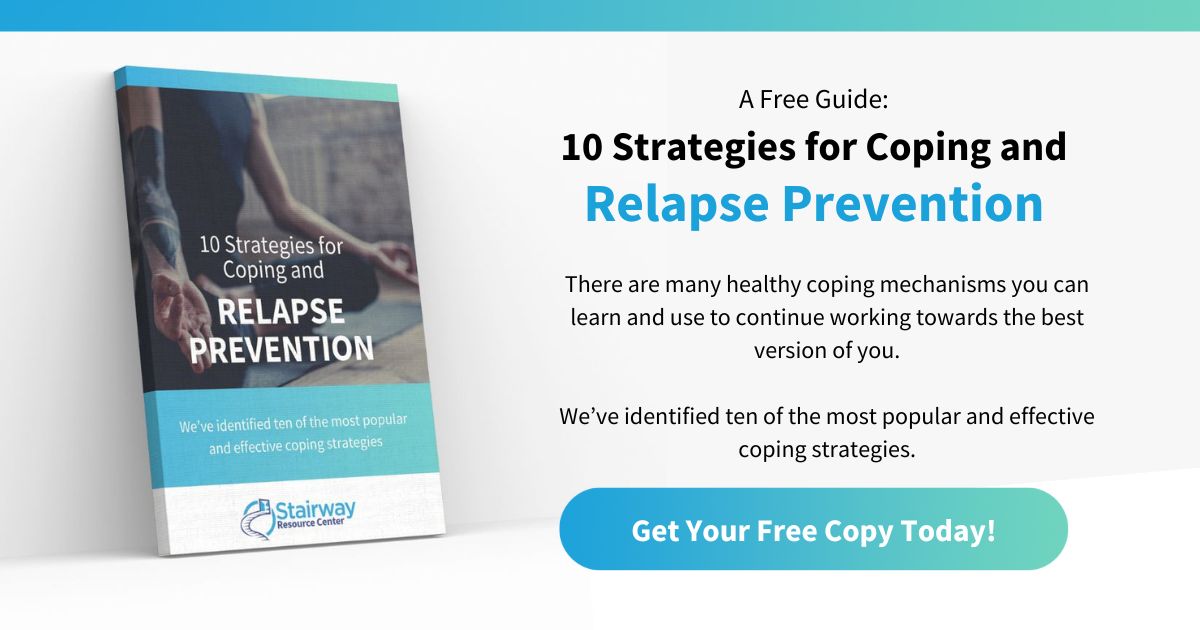When dealing with a substance abuse disorder, it may seem like there’s no easy escape. Most of these disorders are related to other mental health disorders like anxiety and depression, both of which are difficult to treat or even talk about. Even if you manage to become sober, triggering situations can drive you right back to substance abuse, which can make your odds of long-term recovery seem impossible. The truth is, though, it’s entirely possible to achieve such a goal if you have the right tools and coping skills at your disposal.
A good coping mechanism is one that not only distracts you from your most negative thoughts and tendencies, but also teaches you the skills to move forward happily and healthily. The better you become at handling your mental health, the less likely you are to relapse back into your substance abuse disorder. You’ll be more equipped to face your day-to-day life and handle any problems you might face, even if the skills you need seem unhelpful or random at first. A big part of learning about and adopting coping mechanisms is to turn them into a normal part of your routine or into something you do out of habit, because once these things become average for you, you’ll start to see the results you’re after.
Develop Skills to Help With Your Mental Health and Prevent Relapse
A substance abuse disorder can make it difficult to reach out to people, seek treatment, or think clearly, which means that even just finding and developing a coping mechanism might be difficult. So, the first step is to develop the skills you need to use those strategies in the first place, as they’ll be vital to staying sober even after getting help for your substance abuse disorder.
We’ve all heard the term “laughter is the best medicine.” That may be simplifying things, but the core message is true. Comedy and humor are great ways to make yourself feel better and relax, even in moments of stress, to the point where “laughter yoga” is being studied as a potential treatment for depression. [1]Bressington, D., Yu, C., Wong, W., Ng, T. C., & Chien, W. T. (2018). The effects of group-based laughter yoga interventions on mental health in adults: A systematic review. Journal of Psychiatric … Continue reading As depression is a common root cause of substance abuse disorder, a treatment like this can help solve some of the underlying problems and prevent further relapse in the future. Laughing can’t be used to survive all triggers, but it can help you stay positive and keep negative thoughts at bay.
While comedy can make things better, stress and anxiety can make things worse. It’s important to avoid things that stress you out too much while also making efforts to relax and overcome the problem. Being stressed or anxious are normal human reactions to problems we perceive as dangerous or overwhelming, but in our modern times, we don’t need the same ancestral adrenaline rush to solve mundane problems. Instead, these problems simply make us focus excessively on negative things and convince us that even worse things will come, which can drive us into using substances to relax, forget, or even resolve the problem. Instead, try yoga, exercise, or therapy. [2]Bahrke, M.S., Morgan, W.P. Anxiety reduction following exercise and meditation. Cogn Ther Res 2, 323–333 (1978). https://doi.org/10.1007/BF01172650 Of course, it’s best if you can learn to manage stress and anxiety in a healthy way, rather than spending your time avoiding it, as working through your problems is the best available coping method.
Coping Skills Development

Developing effective, healthy coping skills involves finding what works for you and staying healthy while doing it. Some coping mechanisms end up maladaptive or harmful, which include self-blame, self-harm, and suicidal ideation, and are common with depression and similar disorders. Substance abuse disorder, being a disorder born from what’s often a bad coping mechanism in and of itself, is still also a disorder in and of itself, and comes with its own bad coping mechanisms. This creates a cycle that can be very difficult to break from. It’s important to find stronger and healthier ways of coping. [3]Heffer, T., & Willoughby, T. (2017). A count of coping strategies: A longitudinal study investigating an alternative method to understanding coping and adjustment. PloS one, 12(10), e0186057. … Continue reading
In general, coping mechanisms come in a few sub-varieties: task-oriented, emotion-oriented, and avoidance-oriented. Each one can be broken down into more specific . Task-oriented coping revolves around fixing the problem, being proactive, and taking active steps to improve your life, plan ahead, and handle new problems as they come. Emotion-oriented coping involves things like active emotional suppression, telling yourself to “just be happy,” and trying to let go of your emotions. Finally, avoidance-oriented coping is much like what it sounds like – coping by ignoring and avoiding the problem outright through distraction tactics and denial. [4]Thomson, P., & Jaque, S. V. (2017). Self-regulation, emotion, and resilience. Creativity and the Performing Artist, 225–243. https://doi.org/10.1016/b978-0-12-804051-5.00014-7
Task-oriented coping is the strongest of these strategies, even if the other two can help in the short term, because it gives you the skills needed to move forward and face your daily life, rather than teaching you to “turn off” or ignore your problems. The best part is that it’s not difficult to do when you start with small steps, such as keeping a calendar, before you move on to the bigger and more substantial fixes. Going to a substance abuse treatment center is a task-oriented coping strategy as well, because it gives you some help in solving the problem as well as something to go back to if necessary. By talking to someone about your disorder, you’re actively taking steps to be healthier, and future therapy sessions can help you stay on track towards progress.
Using Relapse Prevention Tools and Strategies
The threat of relapse might seem ever-present and easy to fall back into simply due to a bad trigger, major stress, or even a simple bad choice on any given day. Relapse is always a possibility, and one that might carry a lot of unhelpful stigmas attached to it. You can, in fact, prevent yourself from relapsing if you have the right tools at your disposal. It’s just a matter of making use of the skills you have and getting help when you need it.
When it comes to a substance abuse relapse, the dangers are increased with high-risk behaviors, especially if you struggle with handling those risky situations. If you’re convinced you can stay sober, that self-efficacy will help you get through a bad scenario without relapsing, [5] Marlatt, G. A., Bowen, S. W., & Witkiewitz, K. (2009). Relapse prevention. Evidence-Based Addiction Treatment, 215–232. https://doi.org/10.1016/b978-0-12-374348-0.00011-2 but the confidence to face large problems comes from knowing how to cope in the first place. Part of that goes back to task-oriented coping, but there are other ways to prevent a substance abuse disorder relapse.
People often think of external triggers when they hear the word, such as a scent that brings up a bad memory or a location they’re afraid to go back to. However, internal triggers are just as dangerous, if not more, because they involve our emotions and thoughts, and might not always be connected to anything in particular. To combat all kinds of triggers, it’s important to live a healthy life of personal acceptance, closer relationships, [6]Gifford, E. V., Ritsher, J. B., McKellar, J. D., & Moos, R. H. (2006). Acceptance and relationship context: A model of substance use disorder treatment outcome. Addiction, 101(8), 1167–1177. … Continue reading
and better coping strategies. Treating your emotions as okay and normal, being kind to yourself and to others, and reaching out when you feel you need help are all important aspects of recovering from substance abuse and escaping the negative cycle that creates a relapse while teaching yourself healthier ways to handle stress.
Long Term Addiction Recovery Is Possible

A substance abuse disorder is difficult to recover from. You’ll have good days and bad days, and days where you want nothing more than to return to your drug of choice to cope with your struggles. Even after treatment, full, long-term recovery can take years to achieve, and those years will be filled with learning, growth, and personal discovery, but also stress and anxiety. What’s important to focus on is that, if you stick with your healthy coping strategies, foster proper relationships with yourself and others, and learn to laugh every now and again, you can and will keep up with your recovery.
A substance abuse disorder can never be fully cured, which is why even those who have been sober for decades are referred to as being “in recovery.” Recovering from substance abuse is a lifelong journey, but there are many tools at your disposal to help you stay in recovery for as long as possible. The best part is that there’s no need to do it alone, and in fact, you’re encouraged to get help and join the growing community of those in recovery. Whether that means joining sober housing and being in an environment where alcohol and drugs are out of reach or simply getting involved at meetings to tell your story and hear the story of others, there are always places to go and people to talk to who can help you recover not just from substance abuse, but from other underlying mental health concerns as well.
If you know how to cope and have managed to develop the necessary tools and strategies required to prevent a potential relapse, you’re well on your way to living a happy, healthy life for years to come.
Visit our Mental Health Coping Skills and Relapse Prevention Tools resource page to learn more.

Therapist
A former professional and one-time World Champion athlete, David hurt his back in competition and subsequently developed an addiction to his prescribed pain medication. After completing his own stay in treatment, David discovered both meaning and purpose in helping others find recovery and walked away from a prestigious J.D./M.B.A program to focus on psychology full-time. After completing his Master’s in Psychology, he began pursuing his Doctor of Social Work degree from The University of Southern California.
Sources:
| ↑1 | Bressington, D., Yu, C., Wong, W., Ng, T. C., & Chien, W. T. (2018). The effects of group-based laughter yoga interventions on mental health in adults: A systematic review. Journal of Psychiatric and Mental Health Nursing, 25(8), 517–527. https://doi.org/10.1111/jpm.12491 |
|---|---|
| ↑2 | Bahrke, M.S., Morgan, W.P. Anxiety reduction following exercise and meditation. Cogn Ther Res 2, 323–333 (1978). https://doi.org/10.1007/BF01172650 |
| ↑3 | Heffer, T., & Willoughby, T. (2017). A count of coping strategies: A longitudinal study investigating an alternative method to understanding coping and adjustment. PloS one, 12(10), e0186057. https://doi.org/10.1371/journal.pone.0186057 |
| ↑4 | Thomson, P., & Jaque, S. V. (2017). Self-regulation, emotion, and resilience. Creativity and the Performing Artist, 225–243. https://doi.org/10.1016/b978-0-12-804051-5.00014-7 |
| ↑5 | Marlatt, G. A., Bowen, S. W., & Witkiewitz, K. (2009). Relapse prevention. Evidence-Based Addiction Treatment, 215–232. https://doi.org/10.1016/b978-0-12-374348-0.00011-2 |
| ↑6 | Gifford, E. V., Ritsher, J. B., McKellar, J. D., & Moos, R. H. (2006). Acceptance and relationship context: A model of substance use disorder treatment outcome. Addiction, 101(8), 1167–1177. https://doi.org/10.1111/j.1360-0443.2006.01506.x |






















